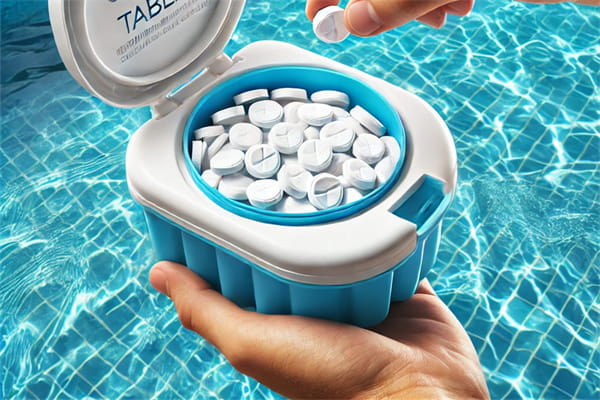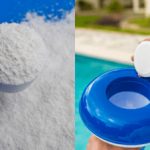Maintaining a clean and safe swimming pool is essential for any pool owner. Proper sanitization ensures that your pool water remains free of harmful bacteria, algae, and other contaminants. When it comes to choosing a pool sanitizer, there are several options available, each with its own set of advantages and disadvantages. In this article, we’ll compare chlorine tablets, liquid chlorine, salt systems, and bromine to help you make an informed decision.

1.Chlorine Tablets
Pros
Ease of Use: Chlorine tablets are incredibly user-friendly. They can be easily added to your pool using floating dispensers, in-line chlorinators, or skimmer baskets. This makes them a convenient option for pool owners of all experience levels.
Consistent Dosage: One of the key benefits of chlorine tablets is their slow-dissolving nature. This provides a steady release of chlorine, ensuring that your pool maintains the proper chlorine levels with minimal manual adjustments.
Cost-Effective: Chlorine tablets are long-lasting and generally more affordable compared to other forms of chlorine. Their slow dissolution rate means you don’t have to add chlorine as frequently, resulting in cost savings over time.
Stable Chlorine Levels: By using chlorine tablets, you can maintain stable chlorine levels in your pool, preventing the common issues of spikes and drops that can occur with other sanitizers.
Cons
Handling Precautions: Chlorine tablets require careful handling and storage. They should be kept in a cool, dry place away from direct sunlight and moisture to prevent them from losing effectiveness.
Potential Clogging: If not monitored, chlorine tablets can cause clogging in dispensers or skimmer baskets. Regular checks and cleaning are necessary to prevent this issue.
2.Liquid Chlorine
Pros
Immediate Results: Liquid chlorine quickly raises the chlorine levels in your pool, providing immediate sanitizing effects. This is especially useful when you need to shock your pool or address sudden contamination.
Easily Adjustable: Liquid chlorine allows for easy adjustments based on your pool’s needs. You can quickly add more chlorine if the levels are low or reduce the dosage if necessary.
Cons
Short Shelf Life: Liquid chlorine loses its effectiveness over time, especially when exposed to sunlight and high temperatures. This means you need to use it relatively quickly after purchase.
Frequent Dosing Required: Unlike chlorine tablets, liquid chlorine requires frequent additions to maintain the desired chlorine levels. This can be more labor-intensive and less convenient.
Handling Hazards: Liquid chlorine is highly concentrated and requires careful handling to avoid skin irritation or accidental spills. Proper storage and safety measures are essential.

3.Salt Systems
Pros
Lower Maintenance: Salt systems produce chlorine automatically through electrolysis, reducing the need for manual intervention. This makes them a low-maintenance option for pool owners.
Gentler on Skin and Eyes: Pools sanitized with salt systems typically have softer water, which is gentler on the skin and eyes compared to traditional chlorine pools.
Cost Savings Over Time: While the initial investment for a salt system can be high, the operational costs are generally lower. Over time, this can result in significant cost savings.
Cons
High Initial Cost: Installing a salt system can be expensive, which may be a deterrent for some pool owners.
Complex Installation and Maintenance: Salt systems require professional installation and regular maintenance to ensure they function correctly. This can add to the overall cost and complexity.
Potential Corrosion: Salt can be corrosive to pool equipment and fixtures, leading to potential damage if not properly managed.
4.Bromine
Pros
Effective in High Temperatures: Bromine is particularly effective in hot tubs and heated pools, as it remains stable at higher temperatures.
Less Odor: Bromine produces less odor compared to chlorine, making it a more pleasant option for pool users sensitive to strong chemical smells.
Stable in Sunlight: Unlike chlorine, bromine remains stable under UV light, making it a good choice for outdoor pools exposed to direct sunlight.
Cons
Higher Cost: Bromine is generally more expensive than chlorine, which can increase the overall cost of pool maintenance.
Slower Acting: Bromine takes longer to kill contaminants compared to chlorine. This means it may not provide the same immediate results.
Handling Difficulty: Bromine can be more challenging to handle and dose accurately, requiring more attention to detail during the maintenance process.
Conclusion
By considering the pros and cons of each method, you can select the best sanitizer for your pool’s needs. If you have any questions or need further advice, feel free to leave a comment or reach out.





